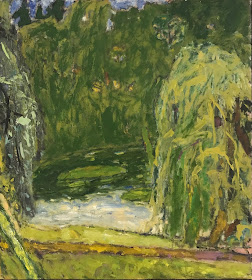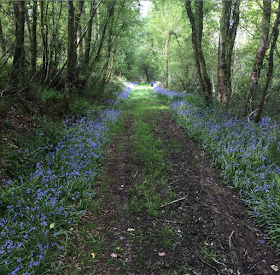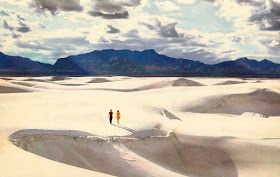David Park Boston Street Scene 1954
Here's some music... "By The River" by Bela Fleck and Edgar Meyer
Above: Fairfield Porter (1907-1975), April Light, 1962
Above: Fairfield Porter, Tree-lined Street, 1972
City parks are a place to find green and open space...
Above: Henri Matisse, Les Gorges du Loup, 1920/1925, National Gallery of Art, Chester Dale Collection
Above: Tom Fairs, Chiltern Pond, outside London 1990-1995
Above: Tom Fairs sketch. Fairs taught fine art and stage design at Central Saint Martins from 1967-1987.
Above: Henri Matisse, Couple Walking in Landscape, One of a series of etchings for a book of poetry by Stephane Mallarme, 1932
Above: Charles Burchfield (1893-1967), Park Landscape, 1916
Above: Roger Muhl (1929-2008), Jardin au printemps, 1987
Above: In London the parks are so big it feels as though you're in the countryside. This is a picture I took in Hyde Park a couple of years ago.
Above: A mown grass pathway through the orchard at Sissinghurst Garden,
Above: Pierre Bonnard (1867-1947), From the Balcony, 1909
Moving into the countryside the walks get longer, nature less planned...
Above: Charles Burchfield (1893-1967), Dusty Road in July, 1952-1958
Above: Paul Nash (1889-1946), The Edge of the Wood, 1919
Above: Henri Matisse Large Landscape, Mont Alban, Nice, Spring 1918. Strange to think that this was painted at a similar time after the 1918 Spanish flu pandemic had started, in January of that year. This is painted in the spring as it is now. Apparently the first wave of flu that spring was mild and may not have preoccupied everyone as it does now.
Above: Felix Vallotton, Paysage Avec Chevre, Vence, 1924. A chevre is a female goat.
Above: Felix Vallotton, A Vallon Landscape,
Above: Alex Katz, shown at Gavin Brown, 2015
Above: Maureen Gallace, Summer Road, 2000
Above: A turkey with her chicks walking down a sandy road in Wellfleet on Cape Cod.
Above: Summer 2018, on the path to St. Ives.
Above: Alex Katz, Landscape, 1953
Above: Milton Avery
Above: Felix Vallotton (1865-1925), Chemin avec fillette portant un panier, 1911
Above: Henri Matisse, Landscape, 1918, collection MOMA
Above: Point Reyes National Seashore, December 2019
Above: Ros Byam Shaw, Instagram, December 10th, 2016
Above: Local hike, July 2013
Above: Point Reyes Station, December 2019
Above: Point Reyes Station, September 2019
Above: John Constable (1776-1837), Study of a Cloudy Sky, 1825
Above: Tumblr, unknown
Above: "Hiking Mount Lowe in 1902"... a socially distanced walk.
Above: Wanderlust by Rebecca Solnit, a book that studies the history of walking, and its inherent value, allowing for spontaneous experiences and time to think. A nice review in the New Yorker here.
Another book about walking was published last year, this one about its neurological benefits..."In Praise of Walking" by Shane O'Mara. It talks about what goes on inside our brains when we're walking, helping us to be more creative, happier, and healthier.
Above: Cornish path, May 2018
Above: Steven's sketch of our daughter, Point Reyes National Park.
Above: Alfred Sisley, Spring at Bougival, 1873, collection Philadelphia Museum of Art
Above: David Hockney, Woldgate to Burton Agnes, 2007. Oil on canvas, two panels
Above: Lois Dodd, Gordon Lane, 1985. There's a great interview with Lois Dodd here.
Above: Alex Katz, Road, 1998
Above: Zenzaburo Kojima, Morning Fields, 1933
Above: Zenzaburo Kojima, Early Fall, 1933
Above: Fairfield Porter, Tree, 1954
Above: Henri Matisse, Crossroads at Malabry, 1916
Into forests,
young with dappled light,
and ancient, deep, dark, and mysterious...
Above: This postcard shows the site of Thoreau's hut, on Lake Walden, Concord, Massachusetts. The hut is no longer there but is memorialized by this cairn of stones. Here's a link to Thoreau's essay "Walking", published a month after his death from tuberculosis in the Atlantic Magazine, in their June 1862 issue. His passion for walking is beautiful to read about in this piece.
Above: Growing up this was my archetypal idea of a forest....Christopher Robin and Pooh's 100 acre wood.
Above: One of my favorite moments in the story...Pooh and Piglet search for a woozle, following increasing footprints that appear to mean more and more woozles when it's really their own steps becoming more numerous with each circle around the path. Pooh is getting very worried until finally Christopher Robin explains things and all is well. I have such fond memories of my dad making up tunes to the songs Pooh sings throughout the books and singing them together.
Above: Painting by Flora Roberts, an artist who paints lovely floral murals and designs wallpaper has just designed her first wallpaper for Hamilton Weston that you can see here.
Above: John Nash, A Path Through Trees, 1915
Above: Ros Byam Shaw, Instagram, May 17th, 2016
Above: Nicolae Grigorescu (1838-1907), one of the founders of modern Romanian painting.
From Emily Carr's Wood Interior Series
Above and below: Paintings by Canadian artist Emily Carr (1871-1945). Not a well known painter in the US, in Canada Emily Carr is an icon, namesake of the Emily Carr University of Art and Design in Vancouver. Carr was born in Victoria, British Columbia in 1871, the year that the province joined Canada. Carr studied in San Francisco, London and in France, being much influenced by the fauvists and bringing that influence home in 1912. Her whole life she'd been fascinated by the art and way of life in the aboriginal villages of the northwest, and turned to those communities for inspiration, bringing a fauvist sensibility to her work. She painted scenes from the villages she visited. To support herself she opened a boarding house and painted very little for 15 years. Eventually her work came to the attention of museum curators and artists and she became part of the group of seven, Canada's most recognized modernists. She found spiritual resonance in Theosophy, forming a vision of god as nature, and painted her vision of the forests in British Columbia. Her most well known and respected works come from this part of her life, starting in her late 50s. This NYTimes piece about seeing Vancouver Island through her eyes gave a great sense of who she was.
Above: Emily Carr, Young Pines in Light, 1935
Above: Emily Carr, Cedar, 1942
Above: Otto Marseus van Schriek (1613-1678). I learned about this artist through seeing Nicholas Party's exhibit at Hauser and Wirth this past March. Party was inspired by Otto Marseus van Schriek's incredibly dense details of forest floors, mushrooms, snakes and all the flora and fauna there.
Above: Light coming through a dense forest.
Above: Walking in the Kumano Kodo, Japan
Above: A forest painted in a gallery by Zhang Enli, at Hauser and Wirth, Someset, 2015.
Above: Olympic National Park
Above: The Amazon rain forest
Above and below: Japanese forests, photo from a beautiful flicker travel feed by Ippei and Janine Naoi. Above from Okinawa, below from Chiba.
Above and below: Hayao Miyazaki of Studio Ghibli found his inspiration for the forests of Princess Mononoke in the forests of Yakushima Island, below Kagoshima. You can read more about the forest, Shintoism, as well as Miyazaki's references in this NY Times article.
Above: A scene from "My Neighbor Totoro" by Miyazaki.
Above: From Tumblr
Above: Photo by William Wegman
Above and below: Asher Brown Durand (1796-1886), Kindred Spirits, 1849. Durand was a member of the Hudson River School of painters. This depicts the painter Thomas Cole, who had died in 1848, and his friend the poet William Cullen Bryant, in the Catskill Mountains. Cole and Bryant had been close friends, and the painting was commissioned as a gift for Bryant who had given Cole's eulogy. You can see the names Bryant and Cole carved into the tree limb on the left of the painting shown in the detail below.
Above: Thomas Cole (1801-1848), The Picnic, 1846. Cole is one of the figures in the painting Kindred Spirits.
Above: Shoda Kakuyu, Green Shade, painting of hikers in a gorge, 1933. This may have been painted from life, as Kakuyu's teacher Yamamoto Shunkyo was an amateur photographer who took his painting students on this kind of excursion.
Above: An article in Holiday magazine, this photo is of Sequoia National Park.
Above: Jessie M. King, Walking in the Woods, 1910
Above: Vintage hiking photo, 1920s
Another song...Essence of Saphire by Dorothy Ashby
Above: Edouard Boubat, Parc de Sceaux, Cerisiers Japonais, 1983
Above: Hamish Fulton, a walking artist,
"A 14 DAY WALK FROM SEA LEVEL AT RIUMAR CONTINUING TO THE TOP OF 1104 METRE BENICADELL ENDING BY THE WATERS EDGE IN ALICANTE SPAIN 16-29 FEBRUARY 2016.
Above and below: Walking sculptures by Richard Long.
The soft grass of open fields blanketing the earth...
Above: Cornwall, May 2018
Above: Leonid Andreyev, 1908
Above: Francoise Hardy, 1966
Above: Ivon Hitchens, The Striped Cardigan, 1938
Distant views, with patchworks of all kinds of greens and a big sky above...
Above: Otto Ubbelohde (1867-1922)
Above and below: Shell worked with an amazing array of great contemporary artists and illustrators to create maps and guides promoting travel in England. This one, from 1964, includes a painting by David Gentleman. It was John Betjeman who originally conceived of the idea in 1933. He wanted to develop guides that weren't focused on "the deeds and residences of royalty and the nobility". and brought his Oxford friends in to write copy and his painter friends such as Graham Sutherland, and Ben Nicholson, and John and Paul Nash to provide the artwork. An enlargement of the image is below.
Above: Georg Schrimpf (1889-1938), At Lauterbach (Tyrol), 1928
Above: Derwent Lees (1885-1931), Landscape at Collioure, 1910
Above: Dorset, May 2018
Above: John Nash (1893-1977), Dorset Landscape, 1930
Above: Etel Adnan, who frequently uses Mount Tamalpais as her subject.
Above: Unknown
Above: Dora Carrington, Farm at Watendlath, 1921
Above: Hiroshige, Ashida
Above: Etel Adnan
Above: Paul Gaugin, Road in Tahiti, 1891
Above: Unknown
Above: James Walker Tucker, Hiking, 1936
Above: Jens Willumsen, A Mountain Climber, 1912
Above: Felix Vallotton, Landscape at Villeneuve-Loubet, 1924
Below: Walking along a river or canal....
Above: Claude Monet (1840-1926), Windmills near Zaandam, 1871
Above: Vincent van Gogh, The Langlois Bridge, 1888
Above: A path along the canal in Omihachiman, Japan, last fall.
Above: Catskill Mountains, 1887
Walking with a glimpse of the ocean...
Above: Mark Gertler (1891-1939), Near Swanage, Dorset, 1916
And one more song...Poem for Eva by Bill Friesell
Above: Felix Vallotton (1865-1925), La Route D'Honfleur
Above: Point Reyes National Park, December 2016
Above: Point Reyes National Park, May 2013
Above: Jason Frank Rothenberg, Point Reyes, 2014, Sears Peyton Gallery
Above: Hiking in Big Sur, January 2012
Above: The Salt Path, by Raynor Winn is a terrific memoir of a couple that embark on the South Coast Walk in Cornwall when they've lost everything suddenly through no fault of their own, and discover that Raynor's husband is terminally ill. With no place to live, and close to penniless, this crazy plan seems to make more sense to them than any other. They embark on a 630 mile walk, along the coast, wild camping all the way. It's an uplifting story, and becomes a best seller. One of the insights that is especially relevant these days is the different reactions they get if they say they've just taken a midlife adventure, thrown caution to the winds, sold up and are wild camping, or if they say they have no home and are wild camping. The adventure is always greeted as inspirational, whereas their homeless reality scares away almost everyone they meet.
Above: This author, and this series of books, provided all the guidance to the Winn's on their walk.
Above and below: Photos from our trip to Cornwall in May 2018. That sign post is one of the markers the Winns were following.
Above: Coastal path between Mousehole and Lamorna, May 2018.
Above: Portrait by Austin Schrmerhorn
Above: Island of Gaiola, Italy, a part of Naples.
Above: Walking in New Mexcio's White Sands National Park, photo-chromatic postcard from the 1950s. It's over 224 square miles of what appears to be white sand but in reality is gypsum.
Above and below: Provincetown, from John Derian's instagram feed, April 2020.
Above: Robert Macfarlane is a passionate walker and hiker. This book is about old foot paths running mostly through the UK but covers some other parts of the world as well. One of the walks I found compelling is called the Broomway... a walk at low tide along the english coast that rapidly disappears at high tide, taking many people with it when they're caught unawares and disoriented. It is described as the most perilous path in England. It starts in Essex at the Wakering Stairs and was the only way to get to Foulness Island without a boat until a bridge was built in 1932. There is evidence it's been a path since 1419. There's a good article about the walk here. It's definitely a good idea to have a local guide!
Above: Photo of Robert Macfarlane by David Quentin, during their walk together on the Broomway.
Above: These are the path markers to help you find your way.
Photo: Finn Hopson
Above and below: Another fascination of Robert Macfarlane's is holloways. Those are recessed paths created by time...centuries of footsteps, hoofs, the wheels of heavy carts rolling, and rain, deepening the path all the way to bedrock. Apparently they take at least 300 years to develop.
Above: Hamish Fulton who took this photo is the one of the artists shown earlier whose practice involves walking
Winter walks and mountainous settings....
Photo: Matt Emmett
Above: Halnaker Holloway, South Downs UK.
Photo: Hamish Fulton
Winter walks and mountainous settings....
Lois Dodd, Water Gap, Last Snowfall, March 2003
Alfred Sisley (1839-1899), Snow at Louveciennes, 1878, Collection Musee D'Orsay
Above and below: Etchings by Roi Partridge from the book "West Coast Portrait", 1946.
Above: Unknown
Above: Unknown
Above: Caspar David Friedrich, Wanderer Above the Sea of Fog, 1818
Above: Gunnar Lundh, 1941
Above: Gino de Dominicis, "Attempt to Fly", 1969
Above: Unknown
Below: Big Sur, December 2008





























































































































































